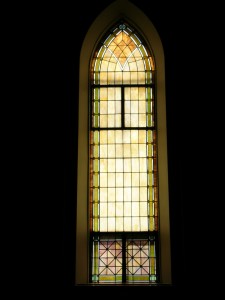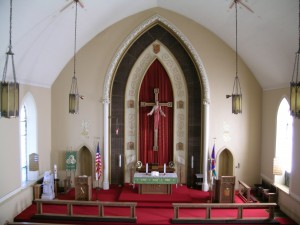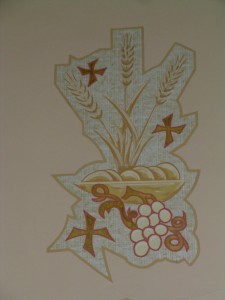Worship
What does it mean to worship God?
God’s first commandment is, “You shall have no other gods.” Since the one true God has given us our life and everything we need, it makes sense that the most important thing in our lives should be Him. Before we need anything else, we need God. So before we love, or trust, or fear anything else, we should fear, love, and trust in God.
But a strange thing has happened to human beings. Even though we know that there must be a God, we don’t naturally know Who He is. How do we please Him? How do we find Him? How can we be sure that He is on our side and not against us, especially when we are confronted by suffering and death?
Since we don’t know God, we can’t love, trust, and fear Him before everything else. Even if we did know God, we still couldn’t, because we resent any being that demands all of our love and trust. By nature, the first place in our hearts goes to ourselves.
True Worship
One can hardly find a society that has ever existed that was without a religion. People have always felt the need for the help of God to defend them against danger, death, and their own failures. And they have always been conscious that they fall short of giving God the honor He deserves.
Since the fall of Adam, people have invented gods and forms of worship intended to satisfy their invented gods. Through rituals, meditation, fasting, sacrifices, and other self-chosen forms of worship, people hoped to win the help of their idols, and overcome death and the suffering of this world.
The Bible teaches that no human works are capable of bringing us near to the one true God, nor are they pleasing to Him. Nothing less than perfect love and trust in the one true God is enough to win His favor.
Instead, the Bible teaches that true worship of God is to receive His favor as a gift.
Because we did not know the true God, the true God made Himself known, appearing in the world as a true human being named Jesus Christ. This person, true God and true man, offered perfect worship to God the Father, loving, trusting, and fearing Him above everything else. Having fulfilled God’s law, He offered His perfect life as a sacrifice to cover the idolatry of the human race. He was nailed to a cross, buried, and resurrected from the dead on the third day.
In Jesus Christ, the true God reveals Himself as the one who takes away our sins. In the proclamation of Jesus, God declares our sins forgiven. Those who receive this gracious gift of forgiveness through Jesus blood—those who believe—are counted righteous and are true worshippers of God, who offer God worship that pleases Him.
What does this have to do with worship at St. Peter?
Simply, we don’t come to worship services at St. Peter to win God’s approval. We come to be in the presence of Jesus and receive forgiveness of sins from Him. We come through Him into the presence of the Father. We come to receive the gift of faith in Jesus by which we worship God “in Spirit and truth” (John 4:24). We come to be strengthened in the daily battle against sin and for the holy lives of loving service to the world.
We call upon the name of the Holy Trinity, the name into which we were baptized. In our Baptism we are buried with Jesus and raised with Him. The life we live is no longer our own, but we are caught up with Jesus in His life as Son of the Father. We are filled with His Spirit and live life not in our own power but as those who have been united with Jesus.
We confess our sins and are absolved, or forgiven, by God through the mouth of the pastor.
In the preaching of God’s Word, Jesus breathes His Spirit into us, giving us faith that our sins have been forgiven by His death on the cross for us.
In the sacrament of His body and blood, Jesus gives us His true body to eat and His blood to drink. We are united with Him, cleansed of sin and healed, given eternal life, and nourished to live life not for ourselves but for others.
What does worship look like at St. Peter?
Our services are liturgical. Our congregation uses orders of worship that Christians have been using for over a thousand years. The Divine Service is composed of two basic elements—the reading and preaching of God’s Word, and the celebration of the Sacrament of Jesus’ body and blood. Matins and Vespers are services centered around the preaching of God’s Word, accompanied by the singing of psalms, songs from the Bible, and hymns. Instead of choosing books of the Bible to study, the church follows a cycle of readings that teach the story of Jesus’ life and ministry, called the lectionary. We sing hymns that proclaim Jesus and His work rather than choruses that talk about our feelings about Jesus.
Our worship at St. Peter does not intend to entertain, but to proclaim Jesus and His finished work of salvation. Nearly all of the parts of the service use the very words of Scripture. By keeping the good prayers, hymns, and ceremonies that Christians throughout the ages have used in worship, we acknowledge that we are part of the “great cloud of witnesses” (Hebrews 12:1) of the Christian Church of all ages. And we learn from the Christians who have gone before us, where we might otherwise be limited to teaching and learning those things that seem relevant to our time.
Who may receive Christ’s Body and Blood at St. Peter?
St. Peter practices closed communion. This means that those who wish to receive the Lord’s body and blood at St. Peter must be instructed in the faith taught by our congregation, and have formally confessed it as their own. Members in good standing of congregations of the Lutheran Church-Missouri Synod and those in fellowship with the Missouri Synod are welcome to receive the Lord’s Body and Blood after announcing their desire to commune to the pastor.
Members of other churches are asked to speak with the pastor before communing. Ordinarily, those wanting to commune at St. Peter are first to be instructed in the Christian faith as taught at our congregation. While we acknowledge that true Christians are found in every church, the Lord’s Supper is also a testimony of our oneness in Christ. Sadly, the oneness of Christ’s Church is not apparent in our world. One church teaches one way, and the next another. We believe that Christ gave one teaching, one faith to His Church. Where there are disagreements about that teaching, they must first be healed before we can announce our oneness in Christ by eating and drinking His body and blood together.
Visitors to St. Peter are welcomed gladly to receive the forgiveness of sins in God’s Word, and to come to the altar to receive a blessing.

